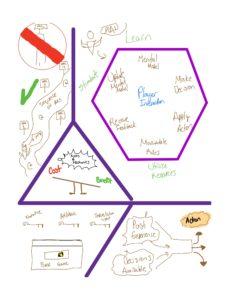Over the last few years we have seen the rise of "serious games" to promote understanding of complex social and ecological challenges, and to create passion for solving them. This project-based course provides an introduction to game design principals while applying them to games that teach. Run as a hands-on studio class, students will design and prototype games for social change and civic engagement. We will learn the fundamentals of games design via lecture and extensive reading in order to make effective games to explore issues facing society today. The course culminates in an end-of- quarter open house to showcase our games. Prerequisite: CS147 or equivalent. 247G recommended, but not required.



I game I enjoy is Pokemon, for this specific arc dissection, I’ll be discussing Pokemon Sword & Shield on the Nintendo Switch. The arc for encountering a pokemon typically follows this structure:
1. Mental Model: You know that when an exclamation mark appears, you found a pokemon. In the past, this means you’ll get the chance to use pokeballs to catch the pokemon before it runs away.
2. Decision: You typically have two options: You can catch the pokemon, or flee, you decide to catch since you’ve never encountered this pokemon before and you are trying to max your pokedex. This has been the same thing you do throughout the game.
3. Action: Throw a pokeball
4. Rules: The game shows you a visual cue of how the pokemon reacted to the pokeball. It zooms in on the pokeball and you wait to see whether the pokemon is captured.
5. Feedback: Based on how your interaction went, you could have either caught the pokemon, caused it to flee, or get another attempt to catch the pokemon. A flee or capture moves you past this stage, whereas another attempt takes you back to the decision.
6. Post: You caught this pokemon and are given information about them. Combining this with your previous knowledge of pokemon built up leading up to this interaction, you add the pokemon to your team or keep them off. You expand your mental model of the game by collecting another component of the game. If you didn’t catch the pokemon, you expand your mental model of the game as well by likely wanting to employ a different strategy for catching the pokemon upon you next interaction. This completes the pokemon encounter arc!